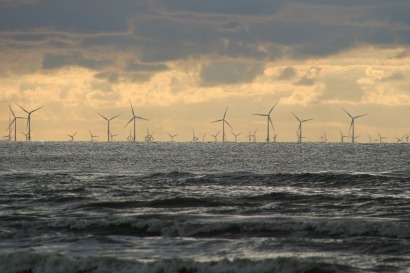
When industry leaders were asked what the greatest cost factors are for them in the UK, a third (33%) said supply chain and fabrication bottlenecks are the biggest issue. Given the industry needs to hit its national production target of 50GW by 2030 to help meet the government’s net zero emissions target, industry bodies and policymakers must take a closer look at the current supply chain and see where greater support is needed for organizations involved in the sector.
Newton’s report found that 71% said their company is worried about remaining financially competitive when investing in offshore wind power projects in the UK or related supply chains, while 67% worry about the ability of UK offshore wind manufacturers to compete with Europe and China.
Developing a strong supply chain is critical if the UK is to remain competitive and attractive for offshore wind investment and increase the country’s renewable energy capacity.
Newton’s report examined how the UK can strengthen its supply chain and deliver the necessary equipment and materials the sector demands. According to the research, three-quarters (75%) of senior leaders in the offshore wind industry believe that the UK should nearshore manufacturing or support domestic supply chains to boost the UK’s offshore wind capabilities. This would reduce transportation costs and simplify logistics, and also minimize risks associated with geopolitical instability.
To make the UK more attractive to investors and unlock further growth in the industry, 27% of industry executives said the UK should establish a specialist supply chain at scale to support floating offshore wind. Three in five (59%) industry leaders themselves also said that their top priority over the next two years was to build supply chain resilience or introduce new contracting models to de-risk projects.
Reallocating resources from the oil and gas sector could also help accelerate expansion of UK offshore wind capacity. For example, creating supply chain synergies such as manufacturing clusters, the electrification of offshore platform operations, and knowledge/technology transfer could help the industry scale up and make the supply chain more fit for purpose.
Dan Parker, Partner at Newton, comments, “The UK’s offshore wind sector has ambitious targets to meet, and with them come major opportunities for growth. The country is a key global player when it comes to net zero, and has already achieved great success in producing offshore wind. To cement the country’s position as one of the most attractive places in the world to invest in renewable energy, there are clear areas that need significant attention. The industry’s supply chain is arguably the single most important area to focus on.
“The overwhelming issue for the supply chain at the moment is that industry demand currently exceeds its capacity - but in fits and starts for any individual manufacturer - with peaks and troughs of activity over the next decade. Innovative solutions are therefore required to help boost supply chain capacity, whether that’s nearshoring or harnessing skills from other areas, such as manufacturing and oil and gas.”

